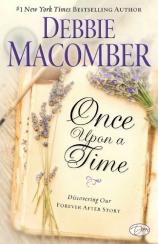Once Upon a Time: Discovering Our Forever After Story
Review
Once Upon a Time: Discovering Our Forever After Story
Debbie Macomber is indeed a NAME, as her women’s fiction titles hitting the bestseller lists one after another for more than a decade. On a different track, she has written inspirational books that include personal anecdotes and draw lessons from her own life, reading and spiritual reflection. Here in ONCE UPON A TIME, her thematic framework is storytelling. Drawing on her experience and insight, she answers questions any would-be writer might ask. What goes into a good story? What makes fictional characters seem lifelike? How can you keep readers’ attention?
Most of the 17 well-titled chapters introduce and jump off from specific literary elements, techniques, or roles: setting, protagonist, backstory and motive, plot, conflict, mission, crisis, supporting characters, mentors, spiritual forces, resolution and redemption. Some of these categories overlap, but when caught up in the chatty prose, one hardly notices.
"If you’re a Debbie Macomber fan or looking for inspiration to get pieces of your life story down in a coherent fashion, where you or others can identify patterns, life connections and God at work, do pick up ONCE UPON A TIME to inspire your discovery of your 'forever after story.'"
In the grand scheme of life, God, the great storyteller, provides us all with the elements that ultimately weave a good tale. With devotional reflection, personal examination, journaling and group discussion, we, Macomber’s readers, can make sense of our journeys and craft our stories.
Toward the end of the book, in a chapter that starts, “In my books I often create that moment when it looks like all will be lost,” Macomber vulnerably reveals her own great trauma, a mother’s grief at the tragic death of her veteran son, lost to depression and suicide. Even here she looks for and eventually finds redemption.
The jacket copy doesn’t really describe this as a book for people who want to write their personal narratives, and yet that seems to be its recurring purpose. “As we tell our stories, a strategy that might not take long is to create a list that answers the question…. What is it you want?” “As each of us begins to tell our story we need to explore the mission that has been set before us.” “Writers often speak about deepening the story…. That’s a great goal for us as we live our lives and tell our stories.” These quotations, from various chapters, are taken from the main text; then each chapter ends with a “Storytelling Prompt” paragraph that gives more specific direction for digging into or drawing out one’s own life narrative. In something like a sidebar, she also quotes from an established writer providing insights into his or her craft.
If you’re a Debbie Macomber fan or looking for inspiration to get pieces of your life story down in a coherent fashion, where you or others can identify patterns, life connections and God at work, do pick up ONCE UPON A TIME to inspire your discovery of your “forever after story.”
Reviewed by Evelyn Bence on June 14, 2013
Once Upon a Time: Discovering Our Forever After Story
- Publication Date: March 11, 2014
- Genres: Christian, Christian Living, Nonfiction, Religion & Spirituality
- Paperback: 224 pages
- Publisher: Howard Books
- ISBN-10: 1451607806
- ISBN-13: 9781451607802





